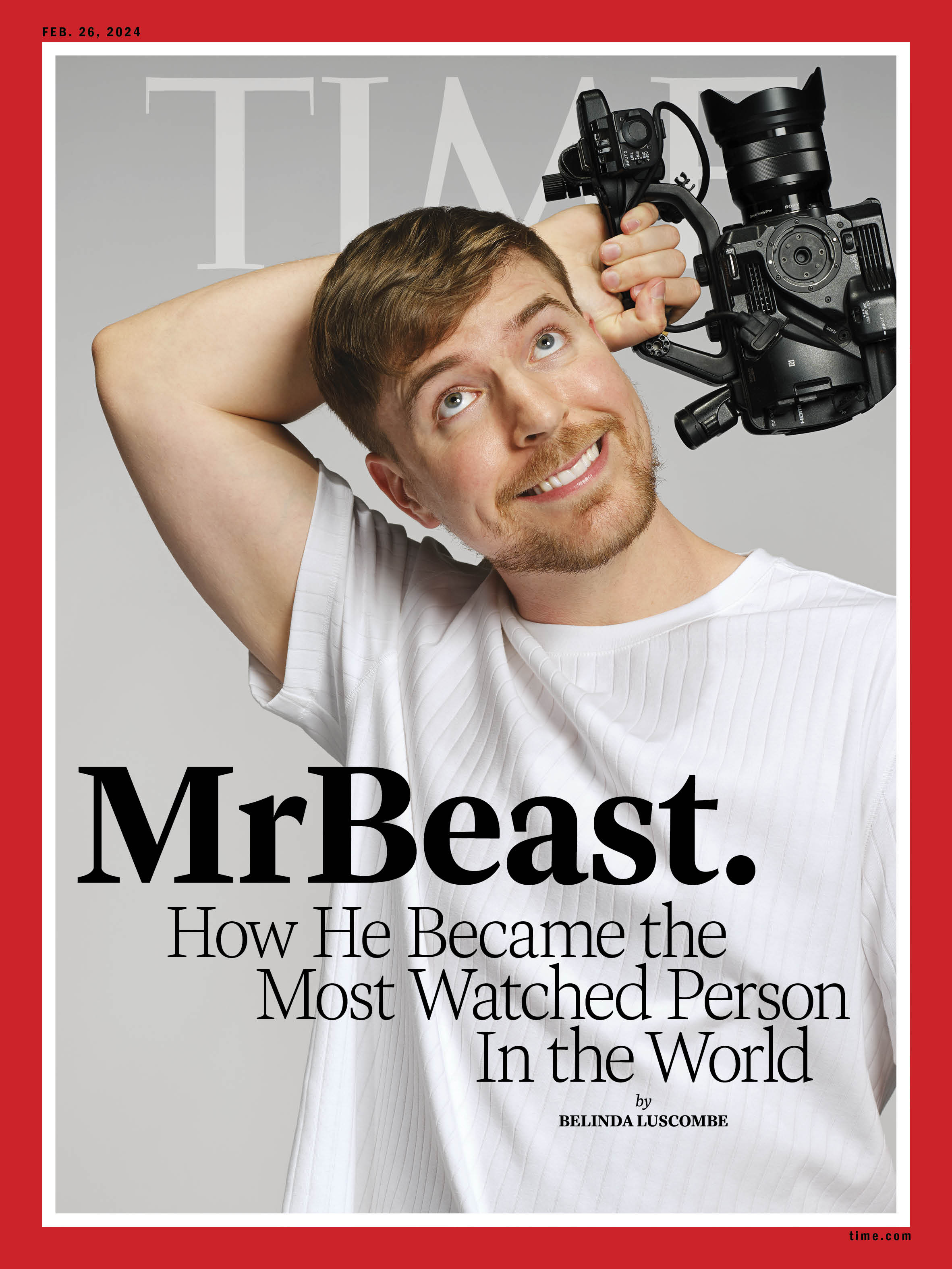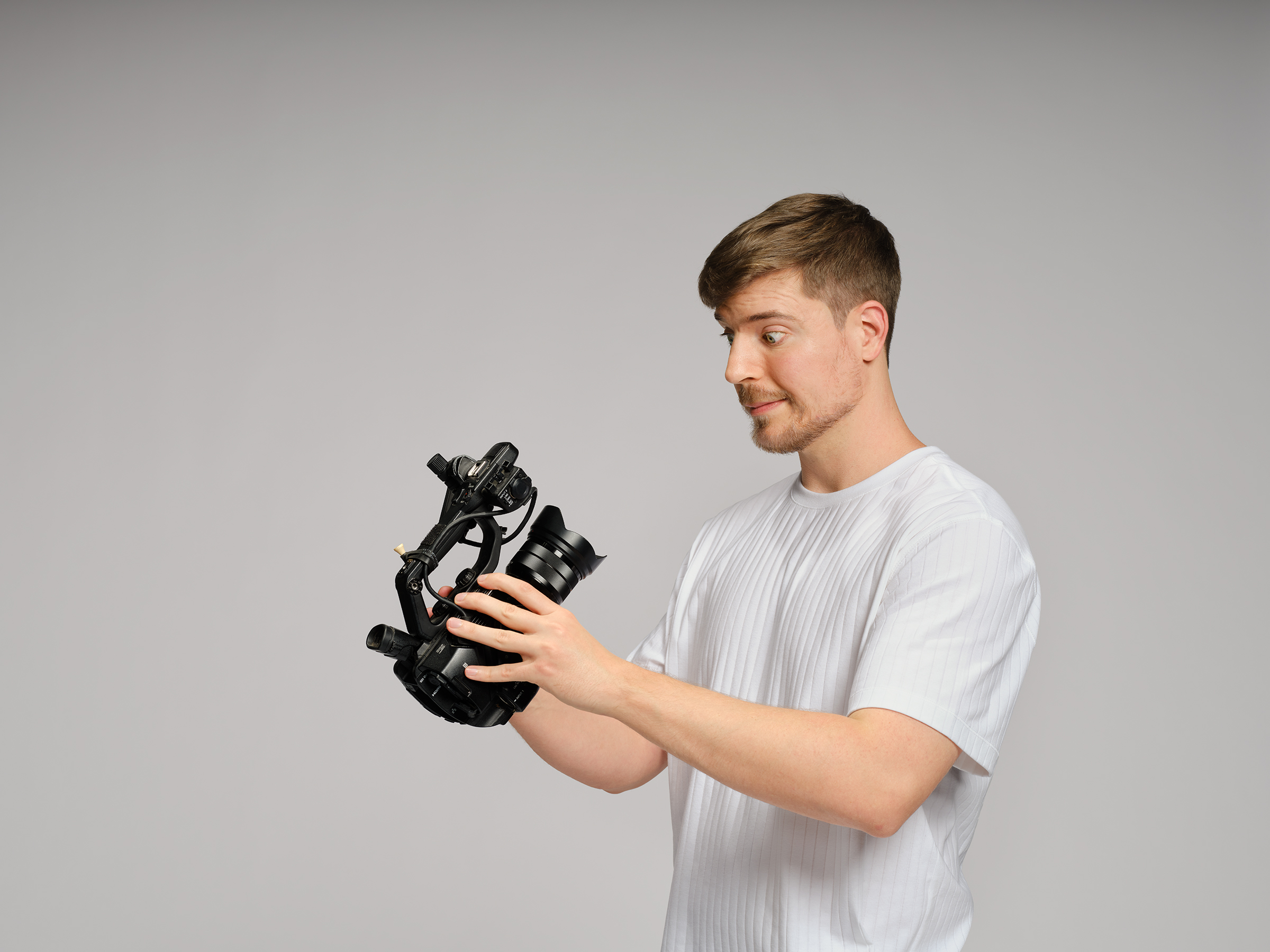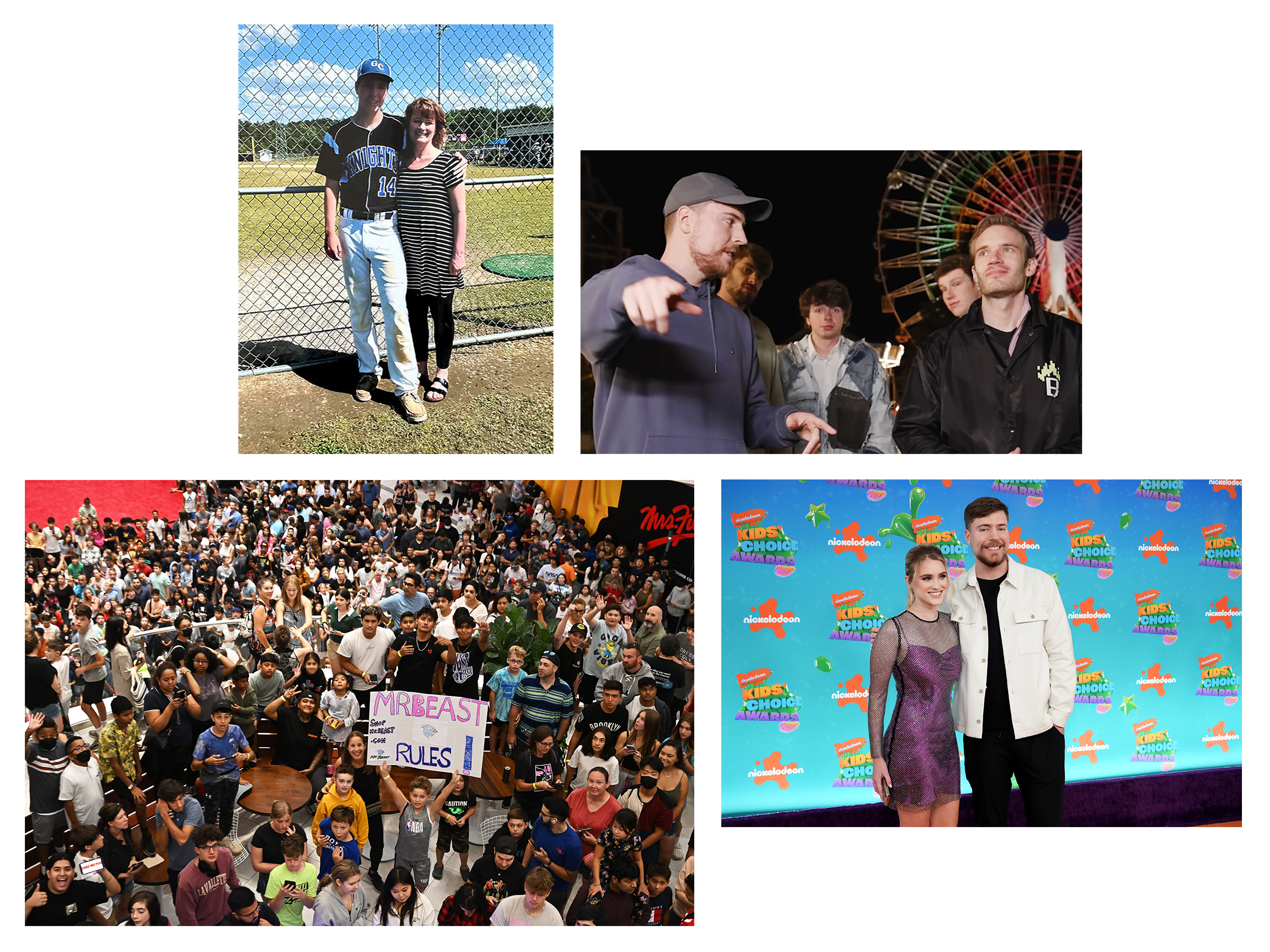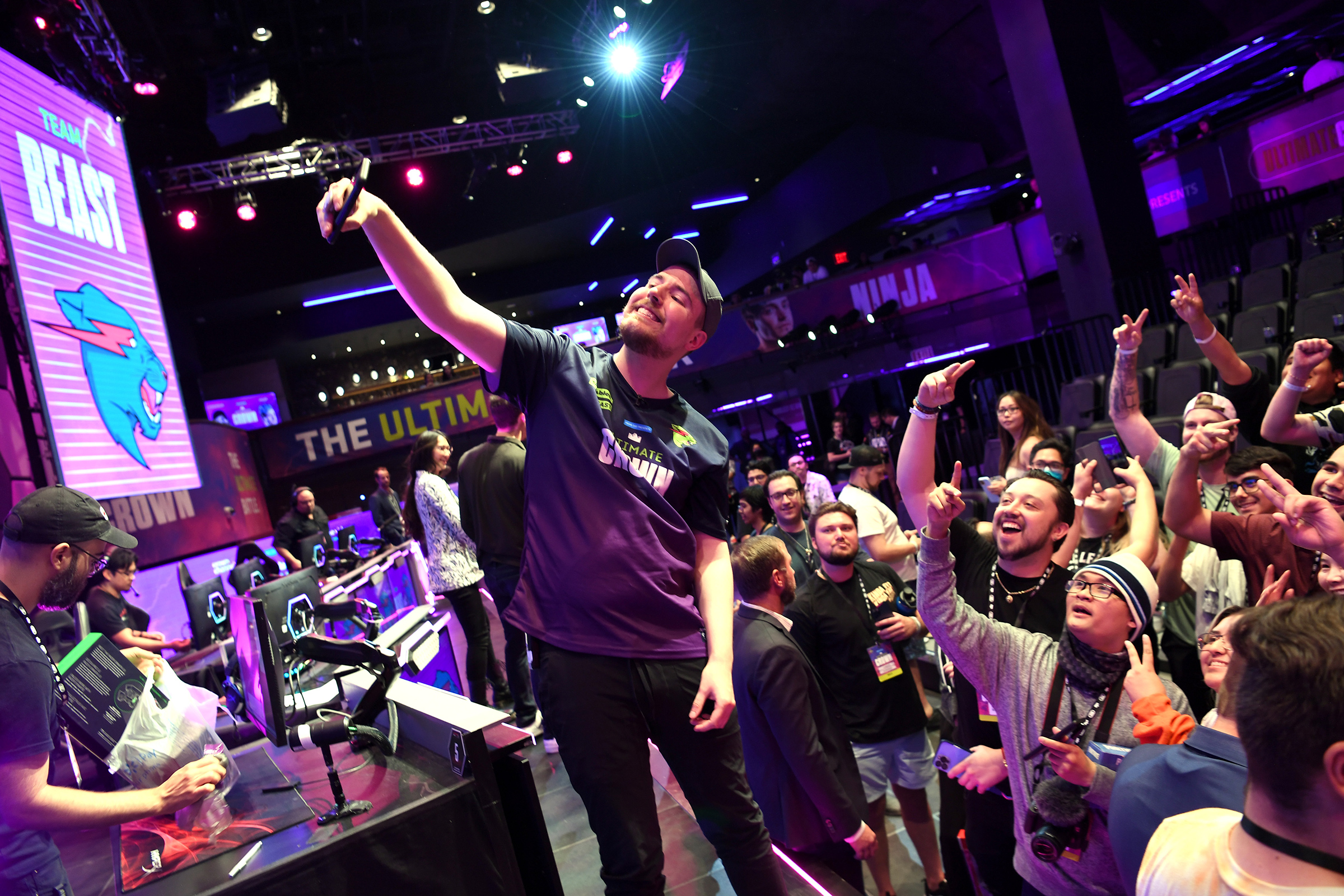“The idea is that he will be strapped to this,” says Kyle Bennett, pointing to a contraption that looks alarmingly like the bed in a lethal-injection chamber. “And we have a glass case that’s gonna go over the top and we have 1,000 spiders that are about the size of my palm that are going to cover him, and I’m personally testing this tomorrow …” He stops and looks around, but the producer has lost his audience. Jimmy Donaldson, the 25-year-old video wizard better known around the globe as MrBeast, has quietly left the room. “Classic,” says Bennett.
Donaldson is supposed to be showing a reporter and a film crew of one around the set for the next in his series of wildly popular videos of improbable stunts. In this one, a contestant must face six of his worst fears to win $800,000, hence the spiders. Elsewhere on the set is a chest of snakes, and somewhere outside there’s a car full of money that’s going to be pushed into a lake. But Donaldson’s not happy. He has been away on another shoot for 11 days, and he’s not thrilled with the progress of this one. “I’m not really good at these things,” says the world’s most successful YouTuber.

Buy a print of the MrBeast cover here
If “these things” are crowd-pleasing diversions, then Donaldson is really, really good at them. A recent video in which he and his posse of besties go on a vacation and spend $1 to $250,000 per day garnered 52 million views in 24 hours. That’s 20 times the number of people who watched the Succession finale and more than twice as many people as saw Barbie or Oppenheimer during opening weekend. His most popular video, a version of the Korean TV show Squid Game, has been seen half a billion times. While few people over the age of 30 have heard of him—unless they have kids—Donaldson is probably the most watched person on earth.
MrBeast videos could best be described as stuff an imaginative 9-year-old boy would try if he had, like, a gazillion dollars. Donaldson crushes expensive cars, gives strangers life-changing amounts of money, holds contests to see who can do a dumb thing the longest. In 2023 alone these videos gained him 99 million new YouTube subscribers, almost double the growth of any other channel. And, in the way of most influencers, he spans all of social media, with about 100 million followers on TikTok, 50 million on Instagram—over 425 million fans in total. He estimates he appears on a screen somewhere in the world about 30 billion times a year. “At this point we kind of know what does well,” says Donaldson. “I can make almost anything go viral.”
In the flesh, Donaldson is a 6-ft. 4-in. mixture of eagerness to please and odd detachment. As we sit in his mother’s office on the second floor of his 63,000-sq.-ft. studio on the outskirts of Greenville, N.C., he keeps offering “context for listeners” to the recording device, no matter that this is a print interview. Asked how he dealt with being buried alive for seven days—in which time he openly wept more than once—he brushes off the difficulty. “Maybe for people who are extroverts it might be harder,” he says, “but there’s at least a million different things I need to think about and process mentally.” These things included how to make his videos better, how a fly that was trapped with him behaved, and whether he was using an “optimal” moisturizer.
Donaldson’s swift rise has been spurred by massive changes in the media landscape where individuals have replaced institutions as the gatekeepers of entertainment and information. He’s proved an adroit Pied Piper, figuring out how to work the YouTube algorithm to hook and keep a crowd. But he’s also disrupting the new ecosystem, showing what’s possible, even far from Hollywood, with a gigantic following. The ethos of doing things differently, of growing quickly and exponentially, has sparked concern among some about the company’s safety and labor practices. For now, though, the question seems less whether Donaldson will get where he wants to go than where he’s going—what the world he is helping shape will look like.

His sway has grown such that in 2022 he launched a line of snacks, Feastables, that by 2023 was in multiple countries and will have, according to him, $500 million in annual revenue this year. Stars the wattage of Tom Brady and Justin Timberlake now appear in his videos, and the Charlotte Hornets wear a Feastables patch on their shirts. And while he models his career on Steve Jobs, he has a little Melinda French Gates in him too. On a second channel, Beast Philanthropy, he performs outlandish tricks of the charitable sort: rescuing 100 unwanted dogs, giving away 20,000 shoes, helping distribute $30 million worth of food that was going to waste. In December 2020, he started a food-delivery service, MrBeast Burger. It grew to a reported 1,700 virtual locations and $100 million in total revenue by August 2022, before becoming ensnared in a legal battle. He also has a toy deal and is reportedly on the verge of signing a nine-figure deal with Amazon.
Get a print of the MrBeast cover here
Most social media influencers reach a certain level and burn out, or run out of money or ideas. Donaldson, who has been on YouTube for 12 years, has grown his channel almost exclusively on wholesome fare and has so far proved that his stamina and discipline match his ambition. Ask him how he thinks he got so successful and he has a simple answer: he just worked harder than anyone else. “It’s a never-ending treadmill for the content obviously,” says Donaldson. “It’s brutal. You’re always on, and it’s a lot of pressure. And this whole system is based around 200 million people just magically showing up and watching my next video.”
Donaldson is not your usual entrepreneur. For one, he’s happy to talk about how much revenue he brings in: about $600 million to $700 million a year. For two, he claims to not be rich. “I mean, not right now,” he clarifies. “I’m not naive; maybe one day. But right now, whatever we make, we reinvest.” He spends lavishly on every video, sometimes shooting as much as 12,000 hours of footage for a 15-minute clip. “Each video does a couple million in ad revenue, a couple million in brand deals,” says Donaldson. “I’ve reinvested everything to the point of—you could claim—stupidity, just believing that we would succeed. And it’s worked out.”
Most of his videos are made from the ground up. He rarely reuses sets and is always in search of new things to demolish. He and his creative team change tack right up until the last minute, and he admits they make expensive mistakes. “We had an hour to come up with, like, 100 ideas,” says Steffie Solomon, a stand-up comedian who worked remotely on MrBeast’s TikTok channel for a year in 2022. It took her a while to get used to how big the budgets were. “Nothing I pitched was too crazy or unfathomable,” she says.
While a steady stream of crazy adventures is Donaldson’s main gimmick, he also keeps viewers engaged by allowing them to feel part of his success. At his say-so, 20 million trees were planted and more than 600,000 people donated enough money, mostly in $5 increments, to help remove 30 million lb. of trash from the oceans. “You always feel like you’re in on his project, that you’re rooting for him,” says Quynh Mai, the CEO of Qulture, a digital-advertising agency. In contrast to the feats he performs, the challenges Donaldson makes to others are not extreme, especially compared with the rewards. “Anyone can hold their hand on a Lamborghini for days,” says Mai, of one of the tests. “His whole perspective is, how do I make the average person extraordinary?”

Grayson Logan, 11, watches MrBeast videos every day at his home in West Memphis, Ark. While his favorite video is the one where the Beast crew spends seven days at sea—“because they had to survive and build shelters, on a raft, and he had all of his friends and they met a little seagull”—something else draws him to the channel. “I like him because he’s super nice and he helps people and gives them money,” says Nolan, who also has a YouTube channel.
The just-folks vibe is key to MrBeast’s formula. If Donaldson is Robin Hood, taking money from rich brands and giving it to stray dogs, Karl Jacobs, Chandler Hallow, Tareq Salameh, Nolan Hansen, and Kris Tyson are his band of merry thieves. Except for Hansen, they’re all longtime friends; to Donaldson, this is more important than their media skills. “Five years ago, we weren’t getting sh-t for views,” he adds. “It’s not like they’re just here to suck the clout out of me.”
“They really believe that they are different, that they are separate from the rest of the entertainment industry,” says Jason Zavaleta, a filmmaker who worked at MrBeast in 2022. “Jimmy gets uncomfortable and gets angry when people use language like PA [production assistant], because it’s too industry.” Instead they’re called FOFs (friends of friends).
Being different, however, cuts both ways. TIME spoke to a dozen former MrBeast employees, and while all admire Donaldson and his vision, they found the company’s attention to detail slipped when it came to adhering to safety norms or maintaining a healthy work culture. Many had signed NDAs and would not go on the record for fear of angering a powerful company. But several producers mentioned pushback around hiring experts for stunts. “They’d always ask us, well, why?” says Troy Guthrie, who believes he was let go from MrBeast because he kept agitating for safety. Guthrie worked on a global-athletics-contest video where a few contestants were injured, and he was distressed at the construction of the sets. After the shoot, as the friends of friends were cleaning up, he says, one of the huge doors contestants had to run between blew over. A MrBeast spokesperson says the company has never let anyone go for asking about safety, on-set medics “promptly addressed any injuries that arose” during filming, and a safety cord kept the door secured when it came out of its track.
Scott Brown, a creative producer who worked for MrBeast from March 2023 to August 2023, says that in order to move fast at MrBeast, “they view safety as, like, being overly cautious or a weakness.” He helped produce the “Train vs. Giant Pit” video and believed the safety procedures were insufficient. When he suggested using OSHA protocols for the pit’s considerable drop, “I was told, ‘We don’t need to worry about that,’” he says. Other producers say they were asked to work with explosives, fast cars, and heavy machinery with very little training and on very little notice. “Let’s just say as an 18-year-old,” says Jay Neo, who moved to Greenville from the U.K. to help on the creative team, “it felt weird to be writing on the board ‘Days Without an Accident’ that needed to be updated every day.” A spokesperson for MrBeast did not respond to an inquiry about the board but said “safety is incredibly important and taken very seriously,” and medics and “experienced professionals tailored to the needs of production” are on every set. “The company is OSHA-compliant,” he added.
Another challenge is profitability. Even though Donaldson has given away millions of dollars to family members, strangers, charities, and other influencers, he says that, like Feastables, his production company was not profitable in 2023, nor is it expected to be in 2024. Marc Hustvedt, who moved from L.A. to run MrBeast’s YouTube business, says that given MrBeast’s gargantuan audiences, brands pay $2.5 million to $3 million to have Donaldson give them a shout-out. To run an ad before one of his videos is about as expensive. A lot of companies are either unable or unwilling to spend about a third of what they’d spend on a Super Bowl ad on one video from a Gen Z kid with a taste for extreme stunts. “What we’ve been trying to do in the market this year is show brands and, frankly, their gatekeepers in the media agencies that this is a trusted product,” says Hustvedt, comparing it to a global sports event. “Every other Saturday, you’re gonna get one of the largest audiences in the world.”

But if all goes to plan, Donaldson won’t need advertisers anyway. “I know a video is gonna get 200 million views,” he says. “And I sell that video to a different company, which is just sad. In a perfect world, I would own a couple of different companies—chocolate, and maybe a global games company—and then that’s what I would promote in the videos.” Feastables, in its second year, brought in about 70% of MrBeast’s revenue. Plans are under way for digital products, including games and apps, and he has several tools for aspiring YouTubers including ViewStats for audience analysis and CreatorGlobal for an audio translation. (A good part of the channel’s growth can be attributed to the languages it’s available in, including Russian, Hindi, Spanish, Portuguese, French, Japanese, and Arabic.)
It all requires an enormous amount of time and effort, especially for someone with a finely tuned need for quality control. Donaldson has 15-hour filming days 20 to 25 times a month and devotes the other days to Feastables. But he’s always been a guy willing to knuckle down if he thinks the payoff will be there. “Hopefully,” he says, “a year or two from now, we’re only promoting things we own.”
According to Donaldson’s mother Susan Parisher, it all started with Crohn’s disease. Donaldson was a promising high school baseball player when he was diagnosed with the condition, which causes an inflammation of the digestive tract. He muscled through games and training, she says. But as it became clearer that he would not be able to pursue sports, he turned his attention to videos. “It was very hard,” says Parisher. “But we can look back now and we can realize it opened the door for the YouTube.” He started his first channel at 13, in 2012, and his current channel a year later.
Parisher, who retired from the military in 2007 as a lieutenant colonel after 21 years of service, landed in Greenville to head up the ROTC at East Carolina University when Donaldson, the middle of her three children, was about 5. Donaldson’s father Charles was also in the military, but the marriage broke up, according to a book Parisher wrote, under the weight of abuse. Father and son are not close. “I haven’t talked to him in a while” is all Donaldson will say on the subject. (Multiple requests to Charles Donaldson for comment were not answered.)
Most of Donaldson’s education was at a local Christian school. “I just remember how conscientious he was,” says Janice Batie, his middle-school English teacher. “It really bothered him that he got a demerit for something. He talked to me for a long time about it.” Donaldson’s infraction was slight, but he was inconsolable, says Batie. “He didn’t like to get in trouble.” His high school English teacher and baseball coach Chris Coggins recalls him giving a talk during speech class about how to work the algorithms. “If you switched out this word for this word, the likelihood of getting a higher view count was higher,” says Coggins. “I don’t know how many high school kids in 2015 would have figured that out.”

Donaldson enrolled in Pitt Community College but didn’t go to many classes. He felt he could learn more on YouTube. The first clue that he had a viable formula came in January 2017 when Donaldson counted to 100,000 and it went viral. His mother remembers it took weeks, not to count, but for him to figure out how to edit the video so it would upload. By the time she enforced her rule that if he wasn’t studying he had to move out, he was making enough money to do so.
“I used to sleep on a mattress in his extra bedroom when he first moved into his house,” says Reed Duchscher, Donaldson’s manager. A former sports agent, Duchscher already represented some influencers but was impressed by the young YouTuber’s attention to analytics. “He was sending me screenshots of his average view duration and his click-through rate,” he says. Donaldson asked him to come and stay so they could get to know each other. Another houseguest was his cousin, James Warren, now his CEO. His mom has worked for him since 2017. Her role seems to be similar to her job as warden at a military prison in Mannheim, Germany: keeping an eye on things. “I don’t have access to any of my bank accounts,” says Donaldson. “I have a CFO and everything, but [Parisher’s] the one who has access to the master bank account.”
Donaldson’s understanding of the algorithm that recommends videos is legendary among YouTubers. He figured out early that the thumbnail (the little picture you click on to launch the video) had to be enticing. His are usually of him with his mouth open, either smiling or grimacing. He also makes sure viewers are told what to expect in the first 10 seconds, so they hang around. Lately, however, he has leaned more on his gut than analytics. “Now it’s just like, how can we make people feel something?” says Donaldson. “When you see the thumbnail, do you say, ‘How did they do that? What the f-ck? Is that real?’ When you have one of those three reactions, you have to click.”
Donaldson’s other obsession mirrors that of YouTube’s executives: audience retention. How can you keep viewers watching a 20-minute video when there’s so much a mere thumb swipe away? Neo, who directed a short MrBeast video about baguettes (1.1 billion views), says he loved working at MrBeast but the focus on retention depressed him and led him to quit the industry. “These algorithms are poisonous to humanity. They prioritize addictive, isolated experiences over ethical social design, all just for ads,” he says. “It’s not MrBeast I have a problem with. It’s platforms which encourage someone like me to study a retention graph so I can make the next video more addicting. At Beast I did that on steroids.”
Recently, people around Donaldson have sought to protect him from caving under his workload. He now has a personal chef and a trainer; COVID-19 testing is still in place. But it’s extremely difficult to protect people from fame. “Three years ago, I would have been like, ‘What’s a couple of photos? Famous people are divas!’” says Donaldson. “Now I get it.” He estimates he has about 15 minutes after the first fan selfie until he has to leave a place or cause a mob scene. At airports, he hides in a bathroom stall or asks a restaurant if he can sit in its kitchen until his buddies get to the front of the line and he can join them. “My solution for all this is I just don’t go in public much,” he says. “Problem solved.”

Despite his youth and prominence, Donaldson has largely managed to stay out of the cultural crosshairs. In 2018, the Atlantic dug up videos of him using a homophobic slur, which were largely shrugged off as adolescent ignorance. “I did not even know what [it] meant,” he says, spelling out the word. Some participants in his videos have complained that it was a grueling experience. And as his staff has swelled—he now has 300 employees on his production team plus 200 or so more at Feastables—there have been growing pains.
Newly hired producers are given housing, good salaries, and three months in which to prove themselves. Of the dozen former employees TIME interviewed, most had no problem with Donaldson but described a company culture that was toxic, with a lot of bullying. “People are experiencing enormous amounts of stress. There’s a lot of fear that you can be fired at any moment,” says Brown, who left to work for a company in L.A. “And because clear feedback isn’t given, it’s hard to know whether that’s going to happen.” Guthrie says he was grateful for the opportunity, but MrBeast was “one of the weirdest experiences I’ve ever been through.” A spokesperson for MrBeast says “the company has high standards for performance and not everyone is best suited for this work.”
Parisher’s title is chief compliance officer, but many employees say she’s effectively in charge of human resources (a spokesperson says she’s not). Zavaleta says he tried to let her know people were unhappy. “I’m going to tell you right now that if the company keeps treating people the way it’s been treating people, Jimmy’s going to have no one left to work for him,” he says he told her. He recalls her being shocked and asking for time, but there was no follow-up meeting. A spokesperson did not respond to an inquiry about this interaction.
“You get all these people in a town where there’s not much else going on but the job,” Brown says. “If you can show that you’re a real believer in the Beast way of doing things, you’re rewarded.” The Beast way is to go hard, say people who have worked there, and not push back. “You can get there faster if you do not give as much value to compassion and professionalism,” adds Brown. Hustvedt, president of MrBeast, declined to comment on personnel issues except to credit the recruiting team with creating a culture where “you have to want to work hard to be here.”
There have been some business snafus too. In July 2023, Donaldson sued his partner in MrBeast Burger, Virtual Dining Concepts (VDC), and claimed the burgers were “disgusting” and “inedible.” VDC countersued for $100 million, claiming Donaldson was trying to “bully” the corporation into making a more favorable deal. Both parties declined to talk about the suits.
Donaldson says he finds constructive criticism in, of all places, the comments. “It’s hard to get him off Twitter,” says Duchscher, using the former name for X. “I lost that battle.” It was on X that he learned he had labeled Taiwan as China and Crimea as Russia on a map that appeared in a recent video. “Yeah, we should have paid way more attention to the map. Big mistake,” says Duchscher. “But nobody really talks about politics in this company. It’s not really a thing.”
Indeed, Donaldson’s videos assiduously avoid hot-button issues. His mother and some of his posse are open about their Christian faith, but the star, who used to have an “I am not ashamed of the gospel of Christ” banner on his YouTube page, now says he needs to do more research. “I believe there’s a God,” says Donaldson. “I just don’t know which one.” So innocuous are his videos that he was recently able to launch his channel on a social media site in China, which blocks YouTube. (“Subscribe for a dumpling!” says the home page.)
Weirdly, the videos that draw the most trenchant criticism are not the ones in which he feeds a perfectly good Lamborghini into a shredder, or valorizes obscene wealth, but those that show him doing good. He’s raised awareness about food insecurity, amputees in Cambodia, the struggles of the Hopi tribe in Arizona, and the plight of orphans in South Africa. He sees this as using his ability to get attention in a useful way; others see this as profiting off misfortune. After he paid for 1,000 cataract surgeries, he was criticized for wanting to look like a hero instead of tackling the underlying systemic inequalities. When he dug 100 wells in Africa, he triggered a barrage of white-savior accusations.
Donaldson acknowledges that these sting, but persists. “I like to do those kinds of videos, because it gives younger kids someone to look up to and be like, ‘Oh, that’s cool,’” he says. “And instead of drinking alcohol, or doing drugs, it’s a role model that they can be like, ‘He does good and helps people.’” Donaldson defends his philanthropic work against charges of poverty profiteering by pointing out that it is funded by his main channel, which sends the charity channel $100,000 a month. All the money a sponsor pays or anyone donates, he says, goes directly to the organization he’s working with. Beast Philanthropy also gives away 100,000 lb. of food every month. “I say this to a lot of our people,” he says. “Ten years in the future, will we look back and our careers are over because we helped blind people see?”
In April 2023, Tyson, Donaldson’s longest-term collaborator, came out as transgender and said she was undergoing hormone therapy, leading to some sponsors leaving. “I knew there was gonna be backlash,” says Tyson, who married and had a child before she transitioned, but there was none from her workplace. “This building we’re in was one of the first places that I was able to feel comfortable enough to present as my authentic self.”
After our interview Donaldson and his gang are getting together to eat, watch YouTube, and maybe play board games. Donaldson loves board games, the longer and more strategic the better. Parisher recalls trying to throw hours-long games of Monopoly by making bad deals, but her son would catch her every time. His friends have similar complaints about his affection for the game Dune. “Jimmy would hate to hear this, but Dune is Settlers of Catan if it took 12 hours,” says Jacobs. “It’s just too much.” But as Donaldson has proved, whether it’s effort, money, or explosions, too much is his favorite amount.
If Donaldson can somehow pull off this very long strategy game he’s playing, if he can create a self-perpetuating media company that makes enough awe-inspiring videos to sell enough of the snacks and apps he also makes to pay for more awe-inspiring videos, what then? In many ways, it’s easiest to understand Donaldson as the elite athlete he once wanted to be. “I just want to be the best and I want to make the best content possible,” he says. Eventually, athletes hit their physical limitations. It’s not yet clear that Donaldson will ever have to stop.
—With reporting by Julia Zorthian
Correction, February 15
The original version of this story misstated the last name of a MrBeast fan. His name is Grayson Logan, not Grayson Nolan. It also misstated the name of the local college. It is East Carolina University, not Eastern Carolina University.
- The 100 Most Influential People of 2024
- Coco Gauff Is Playing for Herself Now
- Scenes From Pro-Palestinian Encampments Across U.S. Universities
- 6 Compliments That Land Every Time
- If You're Dating Right Now, You're Brave: Column
- The AI That Could Heal a Divided Internet
- Fallout Is a Brilliant Model for the Future of Video Game Adaptations
- Want Weekly Recs on What to Watch, Read, and More? Sign Up for Worth Your Time